Mar 2021 2nd Edition
Mar 2021 2nd Edition Estelle Greeff
Translations
Stay alert during COVID-19 level 1
Stay alert during COVID-19 level 1 BathandwaThe country has moved to Coronavirus Disease (COVID-19) alert level 1 but government urges people to continue with all the precautionary measures aimed at curbing the spread of the virus.
The wearing of face masks remains compulsory and there are still some restrictions to maintain low levels of infections and, in particular, to prevent super-spreading events. It has been a year since the first case of COVID-19 was reported in South Africa. More than 1.5 million people have been infected and over 50 000 have died from the disease.
Dr Nkosazana Dlamini Zuma, the Minister of Cooperative Governance and Traditional Affairs, has provided details of the regulations that have changed, including the new curfew, which is from midnight to 4am. People may only be out of their properties during this time if they have a permit or a security or medical emergency.
Gatherings
The maximum number of people attending a religious, social, political or cultural gathering is 100 indoors or 250 outdoors, provided that the venue is big enough to allow for social distancing.
The number of people attending a funeral is limited to 100. If the venue is too small for people to be at least one-and-a-half metres from each other, then not more than 50% of the capacity of the venue may be used. Night vigils or after-funeral gatherings, including ‘after-tears’ gatherings, are not allowed.
Borders
Land borders: Nothing changes as the 20 land borders which have been operating remain as such and the 33 land borders which were closed, remain closed.
Air borders: The five airports that are permitted to allow international travel remain OR Tambo, Cape Town, King Shaka, Lanseria and Kruger Mpumalanga.
Alcohol
All restrictions on alcohol sales are lifted. Normal trade will be allowed – except for sales during curfew hours. Nightclubs remain closed.
Vaccines
South Africa started its vaccine roll-out on 17 February. The President was among the first people to be vaccinated.
“Vaccines significantly reduce the likelihood of a person developing symptoms and becoming seriously ill, and they reduce the overall rate of infection in a population,” said President Ramaphosa.
He said enough vaccine doses had been secured to administer 43 million jabs by the end of 2021:
- 11 million doses will come from Johnson & Johnson. Of these, 2.8 million doses will be delivered in the second quarter and the rest spread throughout the year.
- 20 million doses from Pfizer will be delivered from the second quarter of the year.
- 12 million vaccine doses have been secured from the COVAX facility.
- Government is in the process of finalising the dose allocation from the African Union.
South Africa has 49 vaccination sites across the country, including in rural areas. There are 32 sites at public hospitals and 17 at private hospitals.
Once the vaccination of healthcare workers has been completed, phase two of the vaccine roll-out will begin in late April or early May. Phase two will include the elderly, essential workers, persons living or working in institutional settings and those with comorbidities.
“For this phase, we will be activating many more sites for vaccination in the public and private healthcare sectors so that we can reach as many people as possible in the shortest possible time,” said President Ramaphosa.
Special COVID-19 Grant
President Ramaphosa said though the country’s public finances are under pressure, government extended the period for the Special COVID-19 Social Relief of Distress Grant by a further three months, until the end of April.
“Many people still do not have their jobs back and many households are still feeling the effect of having lost much of their income,” he said.
Now that most restrictions have been removed, it is hoped economic activity will get back to normal, allowing South Africans to work and trade.
While the number of new infections, hospital admissions and deaths has dropped, President Ramaphosa has asked that South Africans do not let their guard down as recklessness might lead the country to a third wave of infections.
“The easing of restrictions should not be viewed as a reason to abandon precautions,” he said.
Vuk’uzenzele: 200 editions of putting people first
Vuk’uzenzele: 200 editions of putting people first UrsulaThis month Vuk’uzenzele is celebrating an important milestone: the publishing of its 200th edition. 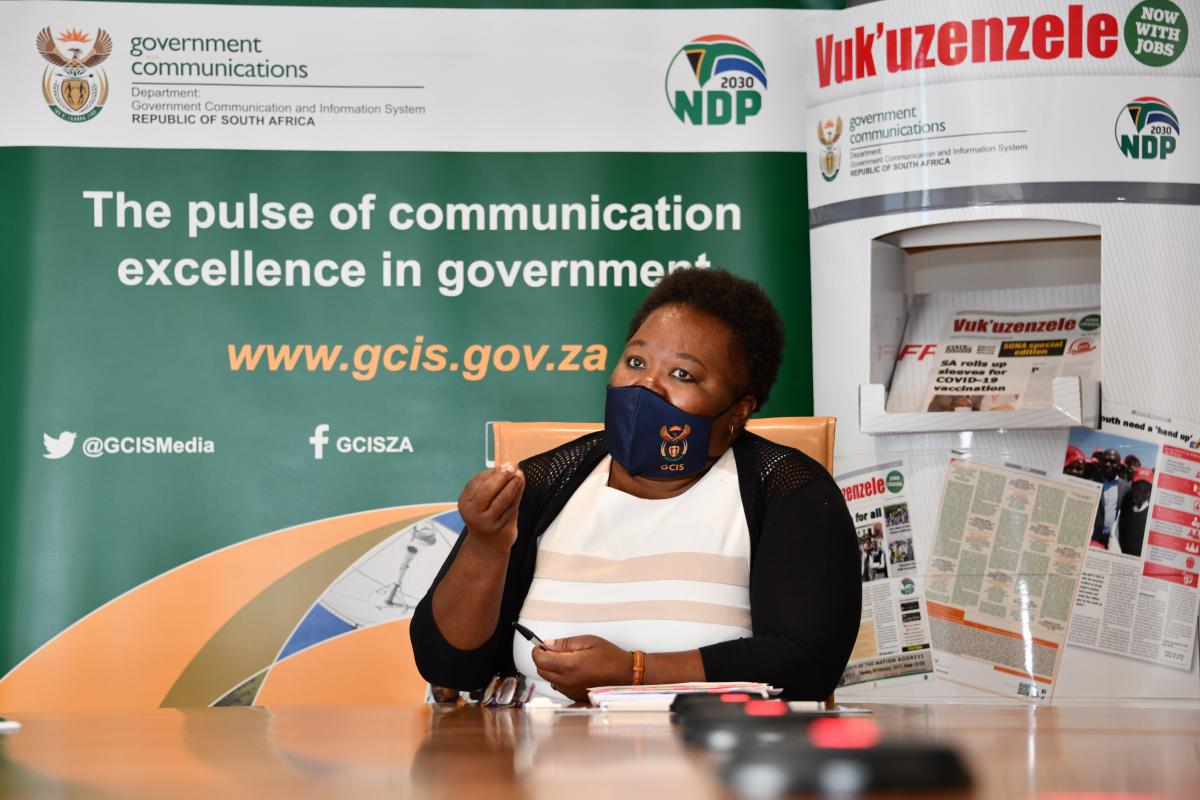
Since it was first published in October 2005, the newspaper has reached millions of South Africans living in rural areas with no access to government news.
Published by Government Communication and Information System (GCIS) twice a month, Vuk’uzenzele aims to help people access important information on government programmes and policies, provide work opportunities and connect fellow South Africans.
GCIS Director-General Phumla Williams said the publishing of the 200th edition of Vuk’uzenzele was more than a celebration for GCIS.
“This is a celebration of underprivileged and vulnerable communities being able to access information that empowers them to change their lives.
“This occasion also celebrates GCIS’s ability to meet its mandate from 1998, which guarantees South Africans the right to information that empowers them.”
With over 254 million copies of Vuk’uzenzele published and distributed free of charge since its launch, Vuk’uzenzele also has the largest print run in the local print industry.
“When we started Vuk’uzenzele we wanted it to reach those in rural communities. One of the issues we had to grapple with was, how do we make this publication accessible? How do we make sure we have a version of the newspaper for those who can’t read English?
“Vuk’uzenzele is available in part in all 11 official languages and braille. We are the only newspaper that has been able to respond to that need. We needed to make sure we provided a publication that is easy to read, accessible, inclusive and talks to the reader,” she adds.
Williams says over the years she has witnessed how Vuk’uzenzele has changed lives.
“What is exciting about Vuk’uzenzele is that it tells stories about real people that motivates anyone who might be thinking, ‘What do I do with my life?’
“A young person may read the newspaper and see someone who has started a green pepper farm. When they see that story it helps them realise that they are also capable of doing it.
“Vuk’uzenzele also gives readers information on how to get help to start their lives. South Africans want to know how to help themselves, but many often don’t know how or where to begin. We have managed to provide government information and respond to the needs of South Africans.”
Vuk’uzenzele also carries government job opportunities which opens doors for unemployed citizens, says Williams.
“We understand that many people are unemployed and cannot afford to buy newspapers, which carry many government jobs.
“We reached out to departments to advertise in Vuk’uzenzele because it is a free newspaper and reaches a wide audience. Our ideal is to get all government departments to advertise in Vuk’uzenzele.”
Williams says the future of Vuk’uzenzele includes plans to increase its digital footprint and to continue listening to the needs of its readers.
“It is helpful to hear what readers want. Our readers must tell us more about the stories they would like to read, like stories about land or agriculture, or the Fourth Industrial Revolution. We need to give readers the opportunity to have their say and find out how they are consuming our content,” she adds.
A professional public service
A professional public service Bathandwa
When I was elected to the position of President of South Africa, I said that building an efficient, capable and ethical state free from corruption was among my foremost priorities.
Only a capable, efficient, ethical and development-oriented state can deliver on the commitment to improve the lives of the people of this country.
This means that the Public Service must be staffed by men and women who are professional, skilled, selfless and honest.
They must be committed to upholding the values of the Constitution, and must, as I said in my inaugural speech, “faithfully serve no other cause than that of the public”.
Over the past two weeks, public consultations have been underway on an important policy document that will give greater impetus to our efforts to bolster, strengthen and capacitate the civil service.
The draft National Implementation Framework towards the Professionalisation of the Public Service aims to build a state that better serves our people, that is insulated from undue political interference and where appointments are made on merit.
The framework was approved by Cabinet in November last year and structured consultation with various sectors of society are now underway.
Twenty-seven years into democracy, it can be said of the Public Service that while several pockets of excellence exist, we have serious challenges in many government departments with regards to skills, competence and professionalism.
All too often, people have been hired into and promoted to key positions for which they are neither suitable nor qualified. This affects government performance, but also contributes to nepotism, political interference in the work of departments, lack of accountability, mismanagement and corruption.
There is also the related problem of political and executive interference in the administration of the Public Service. One need only to look at the instability in government departments when senior managers are swopped or replaced each time a new Minister is appointed.
Directors-General (DGs) and provincial heads of departments (HoDs) are particularly affected. In some departments, DGs, HoDs and executive managers have had stability of tenure, enabling the departments to function with little disruption. In most of these departments where there is leadership stability, audit outcomes tend to be positive and public funds can be accounted for. Where there is a high turnover of heads of department, there is often administrative turmoil.
One of the key recommendations made in the draft framework is that the Public Service must be depoliticised and that government departments must be insulated from politics.
Professionalisation is necessary for stability in the Public Service, especially in the senior ranks. Public servants must be able to continue doing their jobs “regardless of any changes of Ministers, members of the Executive Council or councillors within the governing party in charge of the administration, or changes to political parties after elections”.
We are proposing a number of far-reaching reforms, such as extending the tenure of HoDs based on merit and performance, doing occupation-based competency assessments and involving the Public Service Commission in the interviews of DGs and Deputy DGs.
Introducing integrity tests for all shortlisted individuals will help so that we can recruit civil servants who can serve honestly. We also need to extend the compulsory entrance exams that we introduced in April 2020 beyond senior management. Successful developmental states have similar measures which help advance professionalism within the public service.
As we note in the draft framework, “the bureaucracy must continue to loyally and diligently implement the political mandate set by voters and the party, but to refrain from being political actors themselves.”
We are suggesting a more rigorous approach towards recruitment and selection of public servants, induction and performance management. This includes continuous learning and a clear professional development path for every public servant.
The draft Framework puts emphasis on the need to hold public servants accountable for irregularities, to do away with a culture of impunity in the mismanagement and misappropriation of state resources.
Professionalising the public service involves training for accounting officers across all spheres of government on the applicable legislative provisions.
The National School of Government (NSG) has a vital role to play in this regard.
Professionalism is not only about having the right qualifications and technical skills, but also about having appropriate standards of respect, courtesy and integrity in dealing with members of the public.
The public service is diverse, with a huge range of skills, qualifications and capabilities. Many public servants have specialised skills that are necessary for the effective provision of services. It is therefore not necessarily the case that we need a smaller public service: what we actually need is a fit-for-purpose public service with suitable skills, a professional ethic and a commitment to serving the people.
The men and women of the public service need to be capacitated to play their role in driving development and consolidating democracy. This is our best guarantee of a capable state that serves the interests of citizens.
I call on you to be part of the public consultation process around this draft framework, which is available on the NSG's website, and to make your voice heard.
The Public Service does not belong to any one party, nor should it be the domain of any particular interest group. It should not be a law unto itself.
The public service belongs to the people of South Africa. It must serve them and them alone.
GBV violates basic human rights
GBV violates basic human rights BathandwaThuso Zungu* (not her real name), a 29-year-old woman from Mothutlung in North West, has been trapped in an abusive marriage for almost six years. What started as a ‘mistake’ has now become a weekly occurrence.
 “When we were dating, he never laid his hands on me. In fact, I would say he was actually kind and sweet. A lot changed after we got married. As per African custom, I had to move to his family home and live with his parents and siblings. We stayed there for a year and in that year, he slapped me on two occasions. His family never intervened,” she says.
“When we were dating, he never laid his hands on me. In fact, I would say he was actually kind and sweet. A lot changed after we got married. As per African custom, I had to move to his family home and live with his parents and siblings. We stayed there for a year and in that year, he slapped me on two occasions. His family never intervened,” she says.
Zungu says after she fell pregnant, they moved to their own home and the abuse became more regular. “I was not working and he was the sole provider. The beatings moved from just a slap to punches and vulgar words. It became so bad that one day, I ended up in hospital with a broken arm and swelling on my head.”
She explains that she stays with her abuser because she is financially dependent on him. “Our families also discourage divorce. They say it goes against customs and our belief.”
What they do not understand is that abuse is a terrible violation of human rights and leaves victims broken, she says.
“My biggest fear is that one day he will kill me and my children will be motherless. It is the very same children I think about when I want to leave for good. How will I raise them without an income?”
In South Africa, both women and men experience gender-based violence (GBV) but the majority of victims are women and girls. According to statistics released by Minister of Police General Bheki Cele, in 2019/20, 2 695 women were murdered in South Africa.
Zungu adds that if she could find a stable job, she would be in a position to care for herself and children, resulting in leaving the abusive relationship.
If you need help or want to report GBV contact the GBV Command Centre at 080 042 8428.
How are we raising the boy child?
How are we raising the boy child? BathandwaThe Deputy Minister of Justice and Correctional Services John Jeffery says the country has serious issues of toxic masculinity and patriarchy and it needs to pay attention to how we raise the boy child.
He says despite President Cyril Ramaphosa referring to gender-based violence and femicide (GBVF) as the second pandemic, the cases are still high. 
“We must pay attention to how we bring up the boy child, and ask ourselves what the problem is with men in South Africa. This is not a crime that you can protect people from because you can’t police every home to stop the man from beating up his wife. It’s a societal issue,” he says.
Jeffrey’s department spearheads domestic violence awareness campaigns as one of the initiatives to fight GBVF.
“I don’t know if we understand the reasons why we have higher cases of GBVF than any other country in the southern region. It’s interesting that the banning of alcohol during the national lockdown had an impact on the reduction of GBV and sexual offences. That is something we have to look into,” he says.
GBV in courts
“Sexual offences courts and services, such as intermediaries and court preparation officers, 55 Thuthuzela Care Centres across the country, with five more on the way, are there to provide care and support to victims and survivors of GBV,” he says.
Over 12 000 government officials were vetted against the National Register for Sex Offenders to ensure there are no registered sex offenders.
He adds that the department plays a significant role in the implementation of the National Strategic Plan on GBV, as it predominantly does work through its Promotion of the Rights of Vulnerable Groups Unit and legislative development.
The department recently introduced the Under-the-Tree Men’s Programme, a shared space for various organisations, for men to craft interventions to address patriarchy and its ramifications.
“Many of these recommendations and proposals have found expression in the three new GBV Bills currently before Parliament,” he says.
He believes that as South Africa strengthens its democracy, more citizens have access to justice and enjoy their human rights, but we can still do more in the fight against GBVF
Local doctor opens free clinic for Chatsworth community
Local doctor opens free clinic for Chatsworth community BathandwaA new clinic opened by a Durban-based doctor is assisting the community in the fight against the Coronavirus Disease (COVID-19) and it is doing it for free.
 The clinic, operating from the Havenside Community Hall in Chatsworth, was established by Dr Diveshni Govender (39) in a bid to cope with the second wave of COVID-19 infections. Hundreds of patients have been treated at the clinic since it opened its doors in January.
The clinic, operating from the Havenside Community Hall in Chatsworth, was established by Dr Diveshni Govender (39) in a bid to cope with the second wave of COVID-19 infections. Hundreds of patients have been treated at the clinic since it opened its doors in January.
“The number of COVID-19 patients we were seeing increased to the point where I had to treat some patients in their cars, in the shopping complex where my practice is located,” she says.
Dr Govender contacted community activists to assist with getting her access to use the Havenside Community Hall as a makeshift clinic. Govender says that the clinic is run on donations from several non-governmental organisations, businesses and members of the community.
The 30-bed clinic has helped patients like Jeeveshni Abraham (47) and her family. Abraham, her husband and two children were admitted to the clinic after her symptoms started to worsen.
“At the clinic, we received quality care and medication. We also had access to oxygen to help with breathing a little easier when we were in distress. The clinic also admitted my brother, his wife and children when they contracted the virus, “she says.
When Abrahams and her family were discharged from the clinic they received medicine packages to take home.
Dr Govender says that the free medicine they dispense from the clinic is made possible through donations from members of the community.
According to her, the clinic mainly treats patients who are above 45 years of age, with about 10% of patients under the age of 12. She says that the clinic has also partnered with a private ambulance company to transport patients who need elevated care to a hospital, at no cost.
Dr Govender says: “The partnership has saved several lives as patients who are in urgent need of transport to a hospital no longer have to wait a long time for an ambulance.”
Dr Govender is assisted by two nurses and has also employed a cleaner to assist at the clinic.
Celebrating World Down Syndrome Day
Celebrating World Down Syndrome Day BathandwaDown Syndrome International has confirmed March 21 as World Down Syndrome Day, to celebrate those fighting for the inclusion of their loved ones who are living with the illness.
Down Syndrome (DS) is a chromosomal disorder arising at the time of conception. 
Mpumalanga-based medical practitioner Dr Midah Maluleka says: "There is an extra number 21 chromosome (Trisomy 21) which causes delays in physical and intellectual development. There’s no definite cause for this extra chromosome. It has been proven to have no relation to age, socio-economic status, race or religion. It is also not hereditary."
Maluleka adds that DS is the most common chromosomal disorder in new-borns. "One in 1 000 babies born in first world countries with one in 650 babies born in developing countries, like ours, are affected. At least 80% of children affected by DS are born from mothers under the age of 35, despite women over the age of 35 being deemed to be at higher risk of having a child with DS."
She says because the disorder can be picked up at conception, there are some tell-tale signs to look out for. "In the early stages of pregnancy, a 12- 13 week ultrasound scan is advised.
This accurately measures the thickness of fluid behind the baby's neck, called the nuchal translucency. This is often larger in babies with DS.
Another prenatal test is an amniocentesis. This is when small amounts of amniotic fluid is collected and sent for chromosome analysis. This test is about 98% accurate for diagnosis."
Maluleka says that children with DS are able to live full, healthy and long lives.
“Although there’s no cure, people with DS benefit from loving homes, appropriate medical care, early intervention, educational and vocational services. Due to advanced medical care, most people born with DS today have a life expectancy of approximately 55 years. People with DS have the same emotions and needs as any other person and deserve the same opportunities and care," says Maluleka.
North West-based teacher Tshepo Kekana says, "Not all special needs students need to go to remedial and special schools. There are a few who cope in mainstream schools. With continued learning, support and patience, the students can flourish.”
A second chance at matric – for free
A second chance at matric – for free BathandwaFailed your matric? Don’t worry, the Department of Basic Education is giving you a second chance with the Second Chance Matric Support Programme to help you achieve or improve on your matric results.
Director of the programme, Dr Sandy Malapile, says a matric qualification is a necessity because without it, many doors of opportunity remain closed.
Launched in January 2016, the Second Chance programme supports anyone – of any age – who wants to achieve or improve their matric, per subject and on a part-time basis, for free.
Who qualifies?
Anyone who wants to improve their matric results, no matter how long ago they wrote matric, if they want to obtain an engineering qualification, for instance, and need an improved mathematics mark to qualify for the course.
Anyone who failed matric and wants a redo.
Anyone who left school after passing Grade 9 (then Standard 7), is 21 years or older, and wishes to obtain their matric.
Another chance at matric
Two individuals, one who failed matric and one who performed poorly , shared with Vuk’uzenzele their journeys from the time they received their results to where they are now.
Sizwe Sisoka (26) – a graduate with international experience
 Now holding a Bachelor’s degree in Language Practice, Sizwe Sisoka (26) was shocked when he failed Grade 12 in 2012. He had never failed a grade before. Sisoka had failed his major subjects – Maths and Physical Science and had scraped through in Life Sciences.
Now holding a Bachelor’s degree in Language Practice, Sizwe Sisoka (26) was shocked when he failed Grade 12 in 2012. He had never failed a grade before. Sisoka had failed his major subjects – Maths and Physical Science and had scraped through in Life Sciences.
He says his parents helped calm him down.
“I was amazed at their support and I do not think I would have made it out of that situation without it,,” he says.
Sisoka went back to his school and wrote the supplementary exam but he had failed again. His parent advised him to upgrade and write at the end of that year.
“While upgrading I learnt that my mistake was studying with a group when I was preparing for the National Senior Certificate (NSC) exams. I am better at studying alone. I encourage learners and those who will be repeating to make sure that they know which method works best for them,” says Sisoka.
Before writing his exam he applied to the Durban University of Technology (DUT) and when he passed his matric he enrolled to study Language Practice. During his undergrad, he excelled and that gave him the confidence to go for opportunities presented to him. In addition to his studies, Sisoka learnt Mandarin and French. He has been to China and Reunion Island as part of his studies, which would not have happened had he given up his dream to go to university. He is now attempting a Master’s degree and aims to earn a PhD in future.
Siphamandla Mwandla (23) – now a university student
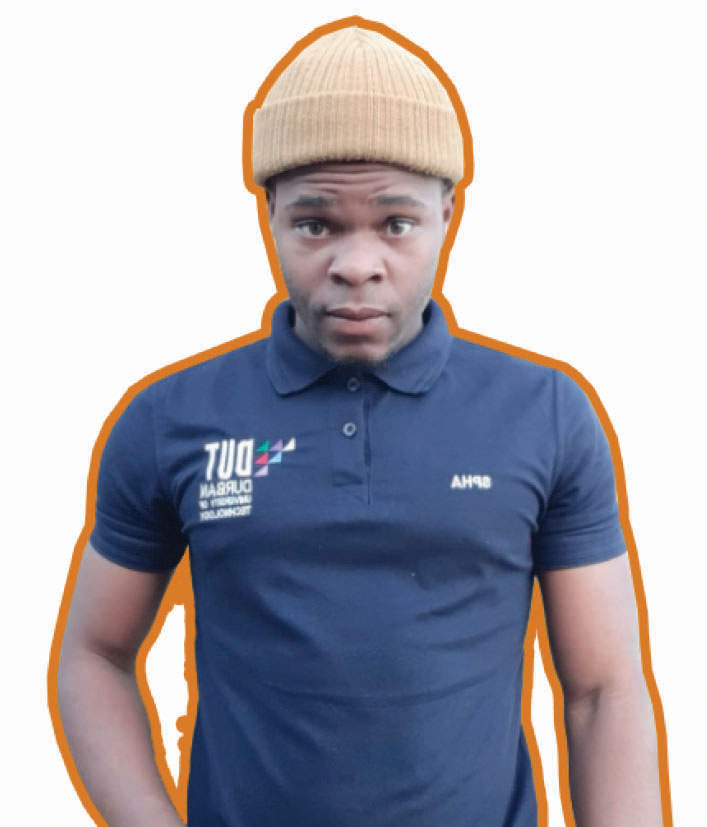 Having relied on his grandmother’s pension during his school years, Siphamandla Mwandla, from Dlangezwa, in northern KwaZulu-Natal, says he felt lost after receiving his results in 2016.
Having relied on his grandmother’s pension during his school years, Siphamandla Mwandla, from Dlangezwa, in northern KwaZulu-Natal, says he felt lost after receiving his results in 2016.
“ I thought that was the last year my granny had to support me and I did’nt know what was to happen next,” he says.
His grandmother and his mom encouraged him to try again. He went for an upgrade but still failed. The family suggested he go back to school full-time with their financial support. He went back to Grade 11 and passed his matric in 2019.
Mwandla was admitted to the DUT to obtain a Diploma in Human Resource Management.
“We all deserve a second chance. What becomes important is when you redo your matric, to be honest with yourself and ask what went wrong. That will help you change your ways. I did that and I made it,” he says.
Ronel Fezeka Wood (21) – from poor results to an LLB programme
 Bagging four distinctions in her 2020 NSC results, Ronel Wood (21) had achieved poor results, in 2019, that failed to get her into a tertiary institute. First fearing what people around her would say, Wood says she felt she would only be doing herself a disservice.
Bagging four distinctions in her 2020 NSC results, Ronel Wood (21) had achieved poor results, in 2019, that failed to get her into a tertiary institute. First fearing what people around her would say, Wood says she felt she would only be doing herself a disservice.
In 2018, her teachers told her that she had potential yet she did not take her studies seriously. Reality kicked in when she received her results results. Due to her poor results she struggled to find a place at tertiary level.
“The thought of going back to school came up but I hated it, fearing what people would say. I eventually decided to go back to school. My parents were super supportive, I had not expected that,”she says.
Wood went back to Grade 1 at a different school and completed her matric last year. She will be studying toward an LLB degree at the University of Zululand this year.
Did you know?
The closing date for the Second Chance programme is March 26.
For more information log on to www.education.gov.za
School produces 100% matric pass rate
School produces 100% matric pass rate Estelle GreeffA Free State high school has helped its first matric learners to beat the odds and pass matric.
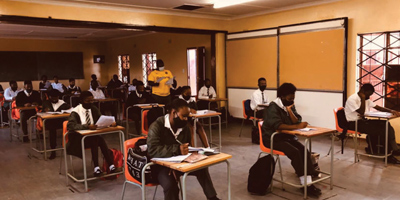 TM Setiloane Secondary School in Thaba Nchu has made the Free State Department of Education proud by producing a 2020 matric pass rate of 100%.
TM Setiloane Secondary School in Thaba Nchu has made the Free State Department of Education proud by producing a 2020 matric pass rate of 100%.
This is major feat considering that the school only added its first Grade 12 class to its education offering last year.
Overall, the Free State’s 2020 matric pass rate was 85.1%, positioning it ahead of all other provinces.
According to principal Teboho Mabitle, the school was established in 1992 as a middle school. In 2015, it merged with Thejane and Ikaelelo middle schools and was renamed the TM Setiloane Secondary School.
“After concluding a teacher qualification audit, it was evident that all were qualified to teach in a secondary school. In preparation for a fully fledged high school, we introduced grades 10, 11 and 12 in 2020,” says Mabitle.
In 2020, the school had 266 learners, 24 of whom were in Grade 12. Four of these learners unfortunately dropped out. This year, the school has 323 learners, 28 of whom are in Grade 12, and 10 educators.
While the school is situated in Selosesha township, most of its learners come from Serwalo Village, Thole Village and Merino Trust. The majority are from impoverished homes, characterised by unemployment and child-headed families.
Tshepiso Sethoba (27) joined the school as a temporary teacher in 2018. “I teach tourism to grades 10, 11 and 12 and business studies to Grade 10. My biggest achievements so far are teaching Grade 12 for the first time and being able to obtain a 100% pass rate with an average of 70%,” she says.
Like all schools, TM Setiloane was affected by the Coronavirus Disease (COVID-19) and the lockdown regulations.
Sethoba says she could not have one-on-one sessions with her learners. To ensure that teaching and learning continued outside the classroom, Sethoba and the school’s management used social media to provide support to learners.
“I availed myself to offer lessons on social media, send previous question papers and address topics that learners found challenging while learning from home. Some of the learners did not have cellphones, so I would send the content to their parents so that they were not disadvantaged,” says Sethoba.
Educate to rehabilitate
Educate to rehabilitate Estelle GreeffThe matric 2020 inmate pass rate is the highest in five years, at 86.3%, with 76 distinctions and 78 bachelor passes.
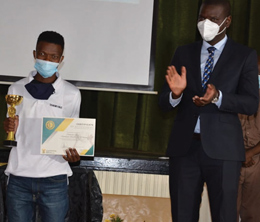 Justice and Correctional Services Minister Ronald Lamola congratulated the matriculants at an awards ceremony held recently at Leeuwkop Correctional Centre in Johannesburg.
Justice and Correctional Services Minister Ronald Lamola congratulated the matriculants at an awards ceremony held recently at Leeuwkop Correctional Centre in Johannesburg.
Last year, the department registered 160 inmates at 17 correctional centre schools. When the country was placed under lockdown, the inmates switched to online learning, including radio and television teaching and learning programmes.
“We congratulate our learners and teachers for their resilience. We extend our gratitude to the Department of Basic Education for its continued support. This performance is yet another great affirmation to the transforming journey of our correctional facilities into centres of new beginnings. “Our pass rate this year is higher than the national average of 76.2%. It’s also higher than the highest provincial percentage of 85.1% attained by the Free State. We are pleased that our results increased, even in the 2020 unprecedented year."
The inmate pass rates for the past five years were:
- 2015 - 72.9%
- 2016 - 72.1 %
- 2017 - 76.7%
- 2018 - 77.3%
- 2019 - 82.6%.
The best performing learner for 2020 was Lwazi Chamane, from Usethubeni Youth Centre in KwaZulu-Natal, with an average of 80.6% and four distinctions in IsiZulu, life orientation, history and tourism. Chamane, now a parolee, was sentenced to five years imprisonment for armed robbery.
He has vowed to never return to the life of crime. "When I arrived at Westville Prison and found that there is a school, I took a decision to better my life. On the outside, there are plenty of disruptions, so this was an opportunity for me to focus.”
Gauteng Education MEC Panyaza Lesufi, also at the awards ceremony, congratulated the group. “In the absence of education, nothing can happen. This must not be education for the sake of education, but must rather be education for change and repositioning our country."
Budget brings tax relief
Budget brings tax relief Estelle GreeffWhile smokers and drinkers will pay more in tax, individual taxpayers will be paying a little less.
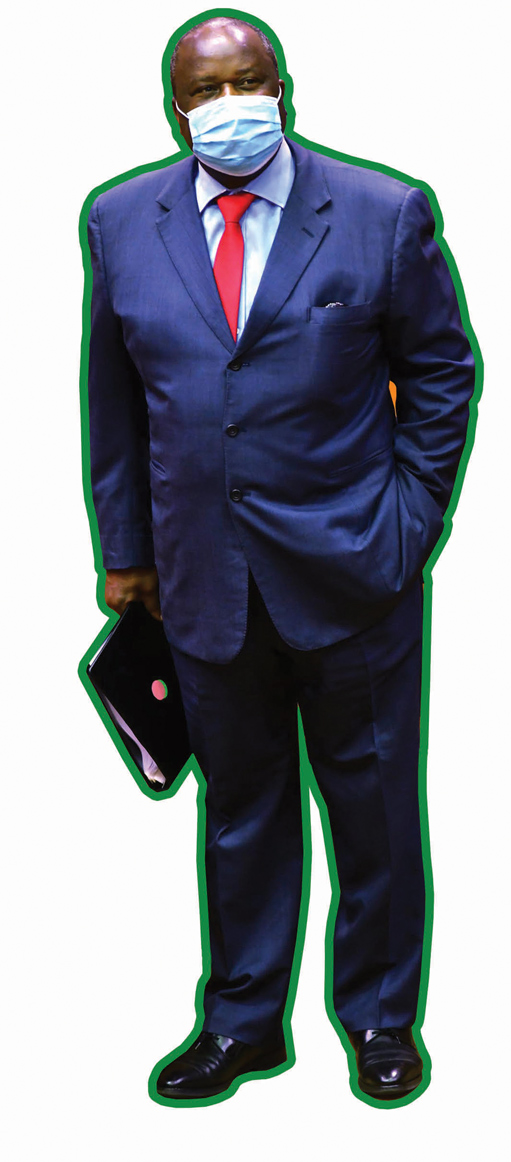 Finance Minister Tito Mboweni assured the nation in his recent Budget Speech that government was working hard to ensure the economy recovers, despite the Coronavirus Disease (COVID-19) pandemic.
Finance Minister Tito Mboweni assured the nation in his recent Budget Speech that government was working hard to ensure the economy recovers, despite the Coronavirus Disease (COVID-19) pandemic.
Before his speech, Minister Mboweni took to social media to ask South Africans for tips to help craft the budget. Many of the people who responded said they were concerned about the tax increase announced in October last year.
They were given some good news when Minister Mboweni said tax increases would be kept to a minimum and that the tax measures spoken about in October would not be introduced.
Tax collection:
- R1.21 trillion will be collected in taxes during 2020/21, which is about R213 billion less than 2020 Budget expectations. This is the largest tax shortfall on record.
- The 5% increase in personal income tax brackets will provide R2.2 billion in tax relief, mainly for lower and middle income households. This means that if you earn above the new tax free threshold of R87 300, you will have at least an extra R756 in your pocket.
Fuel:
- 27 cents increase on a litre. The increase comprises 15 cents per litre for the general fuel levy, 11 cents per litre for the Road Accident Fund levy and 1 cent per litre for the carbon fuel levy.
Sin tax:
- An 8% increase in the excise duties on alcohol and tobacco products.
- 340ml can of beer or cider will cost an extra 14c.
- 750ml bottle of wine will cost an extra 26c.
- 750ml bottle of sparkling wine an extra 86c.
- 750ml bottle of spirits will increase by R5.50.
- 20 cigarettes will be an extra R1.39c.
- 25 grams of piped tobacco will cost an extra 47c.
COVID-19:
- More than R10 billion has been allocated to buy and deliver vaccines over the next two years. Of this, R2.4 billion will go to provincial departments of health to run the vaccine programme.
- R12 billion has been put aside in case there is a need to buy more vaccines or to cater for other emergencies.
- Social security:
- R3.5 billion for provincial departments of social development to improve access to early childhood development services.
- R6.3 billion is allocated to extend the special COVID-19 Social Relief of Distress Grants until the end of April 2021.
- R678.3 million is earmarked for provincial departments of social development and basic education to continue giving free sanitary products to learners from low-income households.
- Social grant increases:
- R30 increase in old age, disability and care dependency grants (now R1 890).
- R30 more for war veterans (now R1 910).
- R10 increase in child support grants (now R460).
- R10 increase in foster care grants (now R1 050).
Job creation:
- Nearly R100 billion will be spent creating jobs. During the Special Adjustments Budget last year, R83.2 billion was made available for public employment programmes. This year, R11 billion is being added for the Presidential Youth Employment Initiative.
Land restitution:
- R9.3 billion will be used to finalise 1 409 restitution claims over the next three years.
- R896.7 million has been set aside by the Department of Agriculture, Land Reform and Rural Development for post-settlement support.
Small businesses:
- R4 billion has been allocated to the Department of Small Business Development for township and rural enterprises.

Meet public health’s new whizz-kid
Meet public health’s new whizz-kid Estelle GreeffYOUTH MATTERS
The youngest active female doctor in South Africa is making a difference in the public health system at the tender age of 21.
 Dr Thakgalo Thibela, who hails from a village in Bushbuckridge, Mpumalanga, matriculated at the age of 15, in 2015, with seven distinctions.
Dr Thakgalo Thibela, who hails from a village in Bushbuckridge, Mpumalanga, matriculated at the age of 15, in 2015, with seven distinctions.
Six years later she received her Bachelor of Medicine and Bachelor of Surgery from the University of Witwatersrand.
Despite her tender age, she is already hard at work on the frontlines of the Coronavirus Disease (COVID-19) pandemic, working as a doctor at a busy public hospital.
Dr Thibela says she knew from Grade one that she wanted to be a doctor and when asked by teachers what she wanted to be when she grew up, she was always very quick to say: “A doctor!”
Making dreams reality
In January, her lifelong dream became a reality when she started working at the Helen Joseph Hospital in Johannesburg, making her one of the youngest people to practice as a medical doctor in South Africa and proving that a person’s circumstances do not have to dictate their future.
She is following close in the footsteps Sandile Kubheka, who made South African history in 2014 by qualifying as the youngest doctor ever at the age of 20.
The go-getter says being a doctor at such a young age has not posed extra challenges for her.
“When I treat the patients, who come to the hospital, they always ask me about my age and are full of compliments when I tell them,” says Dr Thibela.
Starting her career in the middle of the COVID-19 pandemic has been a unique experience. She says it has reinforced the need for healthcare workers to be mindful of their own personal safety when treating patients.
“When you are in the emergency department, you must get to the next patient quickly, but in treating patients in the time of COVID-19, I have learnt that you have to protect yourself first by wearing personal protective
equipment.
“It is only when I am protected that I am able to help other people. When I consult a patient, especially one who has tested positive for COVID-19, I must wear gloves, mask, a face shield and gown.”
Back-up plan
When she completed her matric in 2015, she wanted to apply to study medicine only but was persuaded to have a back-up plan by her older sister and thus also applied to study nuclear science.
She was accepted for the latter and was about to register for the course when her dream came calling.
“I was set to go register to study nuclear science when I received a call from Wits University, saying that I had been accepted to their medical school and that I should go and register the following day.”
In a class of her own
The youngster grabbed the opportunity with both hands and left her home in the rural village of Violet Bank for the bustling city of Johannesburg, where she quickly had to adapt to independent living and a faster pace of life.
Being in a class with people who were older than her was not intimidating, however, because, having skipped two grades in school, being the young student in class was nothing new.
Due to her academic prowess, the young Thibela skipped Grade Seven at Farel Primary School. She repeated the remarkable feat at Lehlasedi High School when she was promoted to Grade 10 without having to do Grade Nine.
“In high school, I was always the youngest in my class so by the time Wits came around, I was used to it. I never really felt the age gap because I matured early in life,” Dr Thibela says, explaining that no-one at university made her feel that her age was an issue.
Dr Thibela says that the next step in her journey is to pursue a career as a surgeon.
Farmers helped to flourish
Farmers helped to flourish angenithaEmerging farmers are being given government support to help them realise their full potential.
The Department of Agriculture, Land Reform and Rural Development is giving black emerging farmers across South Africa the support they need to become top-class commercial farmers.
Through the economic stimulus packages provided by the department’s Land Development Support Unit, targeted farmers across the country are given tractors, planters, boom sprays, offset discs, bulk trailers and other items.
According to Gauteng Land Development Support Unit’s Deputy Director Aifheli Mamphodo, farmers who lease land from the department through its Proactive Land Acquisition Strategy (PLAS) are the beneficiaries.
PLAS was the department’s former land reform strategy that was used to acquire land with high agricultural potential to lease to qualifying farmers.
“Black farmers often do not reach their full potential because of a lack of resources, skills and the means to develop their agricultural enterprises to become sustainable enterprises. Through the economic stimulus programme, the department aims to address the disparities that exist between the established commercial and emerging agriculturalists,” says Mamphodo.
One of the beneficiaries is Lilian Thambo (74) of CTM Farming and Livestock Project in Devon, Gauteng. She has had a leasehold agreement with the department since 2007 for a 360-hectare farm that is zoned for grain and livestock farming.
She went into farming about 14 years ago after retiring from her job as a domestic worker.
“I am happy that the department has given us these implements. I had been struggling for 14 years. With this assistance, I will be able to produce more crops and my plan is to export most of my produce to countries like Brazil,” says Thambo.
She received a stimulus package of over R9-million worth of mechanisation and other implements.
To further help emerging farmers, the department has partnered with commodity organisations such as Grain SA and the South African Grain Farmers Association to provide targeted producer support to farmers who acquired land through land reform programmes.
The department says this is fulfilling the provision of Land and Assistance Act of 1993, which mandates it to facilitate land acquisition and development, among other things.
Farmers wanting more information about the stimulus package can contact the department at 012 312 8911
or email queries@drdlr.gov.za.
Supporting women in agriculture
Supporting women in agriculture angenithaA KwaZulu-Natal woman farmer is pleased that government is supporting emerging female farmers, especially those who come from previously disadvantaged groups.
“We have to teach the youth to learn and to be business-minded with the little they have and to never undermine any business venture,” says Thanda Mbeje, who owns KwaMaNdlovu Gardens in KwaSwayimane, outside Pietermaritzburg.
She says that newcomers to the agriculture industry must not expect to make a profit from the start. They must be patient and be prepared to learn from their mistakes.
Mbeje says she could have given up farming in 2019 when she harvested nothing from the farm after working hard planting crops. Instead, she persevered and today she is harvesting maize and had been picking about 500 heads of corn a day. From this harvest, she makes about R2 500.
“In two weeks I have made R20 000 just from maize alone,” she says.
Mbeje says she has decided to separate her crops and plant with gaps of weeks in-between so she can stretch out harvesting.
Mbeje is one of a few women in the province who own commercial farms. Although she has been learning about farming from her uncle since 2016, Mbeje calls herself a junior farmer as she believes there is a lot she is yet to learn.
Her four-hectare farm, which now has 12 workers, currently produces maize, potatoes, sweet potatoes and amadumbe. She and her brother Manqoba Magidela bought the farm as a family business in 2016 but when he moved to the United States, she was left in charge of operations.
According to the Department of Agriculture, Land Reform and Rural Development, female farmers often come up against similar obstacles including difficulties in accessing land, financial services, knowledge support, and technology.
Delivering a talk during the ‘Women in Agriculture’ webinar recently, the department’s Minister Thoko Didiza said the country had joined a global coalition aimed at championing economic justice for women.
“In this regard, the issue of women’s empowerment will be central in the department’s policies, regulatory reform and programmatic intervention,” says Minister Didiza.
She says that women farmers would be supported to overcome the common challenges they face. Government initiatives to achieve this include ensuring that women benefit from at least half of State land released for agricultural purpose and that these women receive effective training and support, including assistance in securing markets for their goods.
Farmer sows seeds of interest on TikTok
Farmer sows seeds of interest on TikTok angenithaA thriving Mpumalanga farmer and student of a government-funded training course on organic farming, Njabulo Mabaso is making waves on social media with his crop farming tips.
With just over six months’ experience working on a two-hectare plot, Mabaso (27), based in Ermelo, Mpumalanga, has been taking his learnings and sowing seeds of interest with over 10 000 TikTok followers. His videos are about his daily activities on the farm and giving advice to people.
“I read a lot. I’m not referring to academic books but any material that teaches you something. I also enjoy sharing knowledge with other people, hence I link up with them via TikTok,” he says.
Currently growing cabbage, potatoes, chillies and spinach, Mabaso also produces butternut, tomatoes and beetroot.
He says with the unemployment challenge, people need to create opportunities for themselves and therefore his videos aim to help those interested in farming. Mabaso says his family has always ‘worked the land’ and even though he was young, he remembers a lot from that time.
“There is a misconception that agriculture is for the uneducated and we need to work against that because it’s not true.”
Department of Agriculture, Land Reform, and Rural Development visited Mabaso earlier this year and offered him a training course on growing spinach organically.
“I want to specialise in growing spinach and supply it to the whole of Mpumalanga. As I develop and my work expands I will only focus on spinach, so this course will come in handy,” he explains.
Explaining his journey into farming, Mabaso says when he lost his job in April last year, he spoke to his cousin who supported his dream of farming and so he found a piece of land to rent.
“The community has been supportive. Many people buy my produce and I also supply the local shop. This has encouraged me to keep going despite the challenges,” he says.
Although he has been offered opportunities to relocate to other farms, Mabaso is focused on Mpumalanga.
“I want a greenhouse to grow spinach, even in winter. My long-term goal is to have greenhouses in different locations, like Nhlazatshe, Volksrust and Middleburg, so I can supply retailers,” he says.
His National Diploma in Marketing, from Mangosuthu University of Technology, has come in handy because it gave him confidence to approach retailers, he says.
Locust outbreak affects crops in the Northern Cape
Locust outbreak affects crops in the Northern Cape angenithaThe brown locust infestation, which has been destroying crops since January this year, could have a negative impact on farmers in the Northern Cape.
The brown locusts, mostly found in the semi-arid Karoo region of the Northern Cape, Eastern Cape and Western Cape, can migrate over large areas and have been detected in several towns in the province.
The Northern Cape Department of Agriculture, Environmental Affairs, Land Reform and Rural Development's (DAEALRRD) Director for climate change and disaster management Ikalafeng Kgakatsi says the locusts often target the green, leafy part of plants.
Kgakatsi says: “The brown locust hatches in high rain areas. With the heavy rains around the province, we are experiencing a lot more of them than we normally would have. In the past few weeks, we’ve seen a significant increase in the pests.”
Kgakatsi says the spread of the locusts can be managed by spraying a pesticide that DAEALRRD freely avails to farmers.
The pest, found in solitude or large groups, is identifiable through its various colours, according to Kgakatsi.
The locust begins life as a white locust and then turns red. At this stage, they are still small. Once red, the locust develops the ability to hop. At full maturity, it turns brown and can fly great distances, says Kgakatsi.
He says the ability to fly enables the brown locust to damage crops for hundreds of kilometres.
“We’re also working with farmers to target farms that have experienced the impact of the locusts. We compensate them for using their spraying equipment to help us combat the pests.”
The locusts, which are mostly active during summer, often use unused farmlands as breeding grounds.
Kgakatsi says locusts can hatch up to 500 eggs at a time, which can remain undeveloped for months.
Kgakatsi has urged farmers to assist by reporting sightings of these locusts, as they could have a serious impact on their production and the general economy of the province.
To combat the spread of the locusts, the DAEALRRD has appointed locust control contractors and is distributing insecticides, protective clothing and spray pumps.
Jobs: Department of Transport
Jobs: Department of Transport Estelle GreeffThe National Department of Transport hereby invite suitably qualified prospective employees to apply for the following vacant posts
Deputy Director-General: Corporate Services
(Ref. No: DOT/HRM/2021/16)
Deputy Director-General: Rail Transport
(Ref. No: DOT/HRM/2021/17)
Deputy Director-General: Maritime Transport
(Ref. No: DOT/HRM/2021/18)
Deputy Director-General: Civil Aviation
(Ref. No: DOT/HRM/2021/19)
Deputy Director-General: Integrated Transport Planning
(Ref. No: DOT/HRM/2021/20)
Furthermore, the closing date is on Friday, 19 March 2021. The information related to each post can be found on the department website (www.transport.gov.za).
Having a disability only revved this businessman’s passion
Having a disability only revved this businessman’s passion angenithaAn entrepreneur from Willowvale, in the Eastern Cape, did not let his disability stand in the way of becoming an entrepreneur.
Xolile Maposa says a single spark plug is R2 but the cost of travelling to the nearest town where these are sold is R70. “People would travel to Dutywa, 60 kilometres away, just to buy something that costs as little as R2. The problem was that if they did not spend that amount, they would end up spending a lot more on the damage caused by not changing a spark plug.”
The owner of Willowvale Motor Spares and Fitment Centre, who has had a disability in his left leg from being injured in a soccer game at the age of 13, says the business has also benefitted the local taxi industry. Local taxis lost money travelling to Dutywa for a tyre change or to buy spare parts.
“The taxis that operate in the Willowvale villages would lose over an hour or more, in travel time, when they needed parts. Now the driver can buy and install a part while he waits for his taxi to load,” says Maposa.
Maposa attributes his success to assistance he received from the Small Enterprise Finance Agency's (Sefa) funding scheme. The Amavulandlela Funding Scheme was solely created to fund businesses started by entrepreneurs with disabilities.
The scheme is targeted at small, medium and micro (SMMEs) and co-operatives that have at least 51% ownership by entrepreneurs with disabilities. In addition to this, Sefa requires that:
- the funded person must be involved in the daily running of the business.
- financing applications must be financially sustainable.
The scheme funded the Willowvale Motor Spares and Fitment Centre to the tune of R139 000, which allowed Maposa to expand his stock offering with a tyre fitment business. The entrepreneur has two employees to assist with the business.
The scheme offers entrepreneurs with disabilities a credit facility of between R50 000 and R5 million, at a fixed interest rate of seven percent. Beneficiaries of the scheme have a period of up to five years to pay back Sefa.
To apply for the Amavulandlela Funding Scheme the following
needs to be done:
- Submit a business plan or proposal to Sefa.
- Complete the Sefa application form which can be downloaded from the agency’s website: www.sefa.org.za.
Opening the markets for upcoming farmers
Opening the markets for upcoming farmers angenithaKamogelo Malema from Ga-Rankuwa, a township north of Tshwane, is helping farmers reach untapped markets through the Black Farmer Food Group (BFFG).
This company acts as an agent on behalf of farmers, providing them with access to market through a fresh produce market.
Raised in the villages of Madidi and Dilopye, Malema grew to appreciate the value of subsistence farming: "I got into farming because of the passion I have for it. I grew up in rural areas where subsistence farming was part of our daily life.
Having a financial and accounting background helped Malema make sense of the business of farming, not just for himself but for potential clients too. "The plan to open a market in the township where black farmers bring their produce to be sold started in 2018.The aim has always been for black farmers to own the entire value chain,
so we can know our business and benefit from it as much as possible at every stage of the produce journey until it’s consumed."
The group used social media platforms such Facebook and Instagram to advertise and sell their products which include fresh vegetables and livestock such as chickens, cattle, sheep, pigs and goats.
In the instance of livestock, digital communication has proven to be most effective for us and the client."
Malema says the journey has not been easy but his mentors have helped a great deal. "I was fortunate to have mentors who helped me tap into a bigger market. Kobus Du Toit, Malcolm Ferguson and Leona Archery involved with the Agricultural Development Agency helped connect me with farmers when the market first opened.
"Convincing the community we can supply consistent and good quality produce was also a stumbling block. The group will be launching an investment programme to help facilitate investment into a farm for three months (one harvest cycle).
"A person can fund a black farmer. For example, cucumber for one harvest cycle. Once ready, the farmer sells the produce and returns the capital plus interest to the investor. This helps the farm to build up money for reserves and farm more,” Malema says.
Seed of Hope helps bring love of reading
Seed of Hope helps bring love of reading angenithaIn line with the Department of Basic Education’s (DBE) focus on early grade reading, non-profit organisation Seed of Hope will launch a book book club to inspire and review books
 The book club is one of many child and youth programmes introduced in Bhekulwandle, a community located south of Durban, KwaZulu-Natal.
The book club is one of many child and youth programmes introduced in Bhekulwandle, a community located south of Durban, KwaZulu-Natal.
The Seed of Hope Development Centre focuses on child and youth development through its programmes. Londiwe Myeza, the organisation’s chief executive officer, says the book club falls under Simunye, an after-school programme that is run by the organisation in the community for grades R to 7. The Simunye programme teaches learners critical thinking skills and how to creatively and imaginatively tackle decision making.
Reading for meaning
Launching the National Reading Coalition in 2019, Basic Education Minister Angie Motshekga said government was concerned about the inability of many learners to read for meaning, and this was one of the greatest challenges facing South Africa’s basic education.
“We must as a matter of urgency address the prevalence of poor comprehension of reading texts amongst a particular section of society,” said Motshekga.
Myeza says the organisation has a small library that will become the home of the new book club. Children already meet monthly to read and review various books.
The DBE advises parents to use the following tips as a way of spurring a love of reading in children:
- Parents and guardians (who are literate) must read to children from when they are small, even before the can talk.
- When children have learnt to read, every household should have at least half an hour reading time in the evening when everybody in the house, including adults, read for pleasure.
- All children must have access to reading material, even newspapers. If they don't, take them to the library.
- If at all possible, provide a quiet and comfortable space for children to read.
- Give children books as gifts, not just gadgets.
Cycling programme helps youth shift gears
Cycling programme helps youth shift gears angenithaGO!Durban Cycle Academy continues to create opportunities for young people.
Celebrating five years, the GO!Durban Cycle Academy continues to be lauded for its youth development efforts in KwaZulu-Natal.
The largest cycling development programme in South Africa- with 400 beneficiaries from Inanda, Chesterville, KwaDabeka, and KwaMashu- aged 6 to 18, this joint initiative between eThekwini Transport Authority and Green Corridors NPC, offers free cycling training, academic support and life skills.
The primary objective is to offer recreational cycling at grassroots level. Riders also get to compete provincially and nationally, based on skill and academic results, thanks to the ‘no pass, no race’ rule.
The Head of eThekwini Transport Authority, Thami Manyathi, says the academy encourages active mobility within communities that previously had no access to the sport.
“Little did we envision this would become more than a place to learn to cycle. Through the efforts of managers, coaches and teachers, these youths have shown improved academic results, cycling abilities and greater involvement and commitment to the sport and to their communities,” he says.
Thamsanqa Makhanya, from Inanda, who always wondered how he could join the sport, says: “I didn’t know how to cycle until a friend took me to the academy. I’m now a pro and have taken part in major races with sponsors who support me, not just in the sport, but in life.”
Makhanya says youth are lost to drugs in his area, something he is grateful to have escaped.
Phumelele Sibiya, whose 12-year-old daughter Awa-
nde belongs to the KwaMashu Bike Academy, says in addition to gaining cycling skills, her daughter has improved academically.
“The academy takes our kids off the street, providing them with a healthy lifestyle,” she says.
Nomfundo Mtshali (19) says: “I was selected because I was one of the girls who enjoyed being at the bike park and had good cycling skills. I’m now part of the Velosolutions Izimbali team. Without the academy, I don’t think I would have had these opportunities,” she says.
In 2019, the programme expanded to include a musical theatre academy.
Jobs: Department of Justice and Constitutional Development - March 2022
Jobs: Department of Justice and Constitutional Development - March 2022 tsoanaPost: Deputy Director General: Institutional Development And Support (12 months contract appointment) REF NO: 22/52/DG
Branch: Corporate Services
Salary: R1 521 591 - 1 714 074 per annum (All inclusive package). The successful candidate will be required to sign a performance agreement.
Centre: National Office, Pretoria
Requirements: An appropriate undergraduate qualification (NQF level 7) and a post graduate qualification (NQF 8) as recognized by SAQA in Management Sciences/ Social Sciences/ Legal qualification; 8 - 10 years of experience at a Senior Managerial level.
Enquiries: Mr O Melato (012) 315 1351
Post: Court Manager REF NO: 2022/38/GP
Centre: Magistrate Kempton Park
Salary: R477 090 – R561 981 per annum. The successful candidate will be required to sign a performance agreement.
Requirements: Three (3) year qualification in Administration and / or National Diploma Services Management (NQF level 5) plus the module on Case Flow Management or relevant equivalent qualification; 3 years managerial or supervisory experience.
Enquiries: Ms RR Moabelo (011) 332 9000
Post: Master (This is a re-advertisement applicants who previously applied may re-apply) REF NO: 22/66/MAS
Centre: Master of the High court: Pietermarizburg
Salary: R1 057 326 – R1 245 495 per annum. (All inclusive remuneration package). The successful candidate will be required to sign a performance agreement.
Requirements: An LLB Degree or 4 years recognized legal qualification at NQF level 7; 5 years’ experience should be at middle/ senior management level.
Enquiries: Mr. S. Maeko (012) 315 1996
Post: Assistant Director: Payroll REF NO: 30/2022/WC
Regional Office: Cape Town
Directorate: Finance
Salary: R382 245 – R450 255 per annum. The successful candidate will be required to sign a performance agreement.
Requirements: An undergraduate qualification (NQF level 6) as recognised by SAQA in Financial Management; Three (3) years’ experience at supervisory level; Knowledge of Public, procurement processes, financial administration processes; Public Finance Management Act (PFMA).
Enquiries: Ms M Zietsman (021) 462 5471
Closing date: 14 March 2022
NOTE: Interested applicants may visit the following website: www.justice.gov.za or www.dpsa.gov.za to view the full job specification of the above positions. Interested applicants must submit their applications for employment to the postal or hand deliver to the Department as specified in each post. The application must include required documentations only completed and signed new Form Z83, obtainable from any Public Service Department or on the internet at www.gov.za.
Momentum Centre, 329 Pretorius Street, Pretoria
Private Bag X81, Pretoria, 0001
Tel: 012 315 1111
www.justice.gov.za